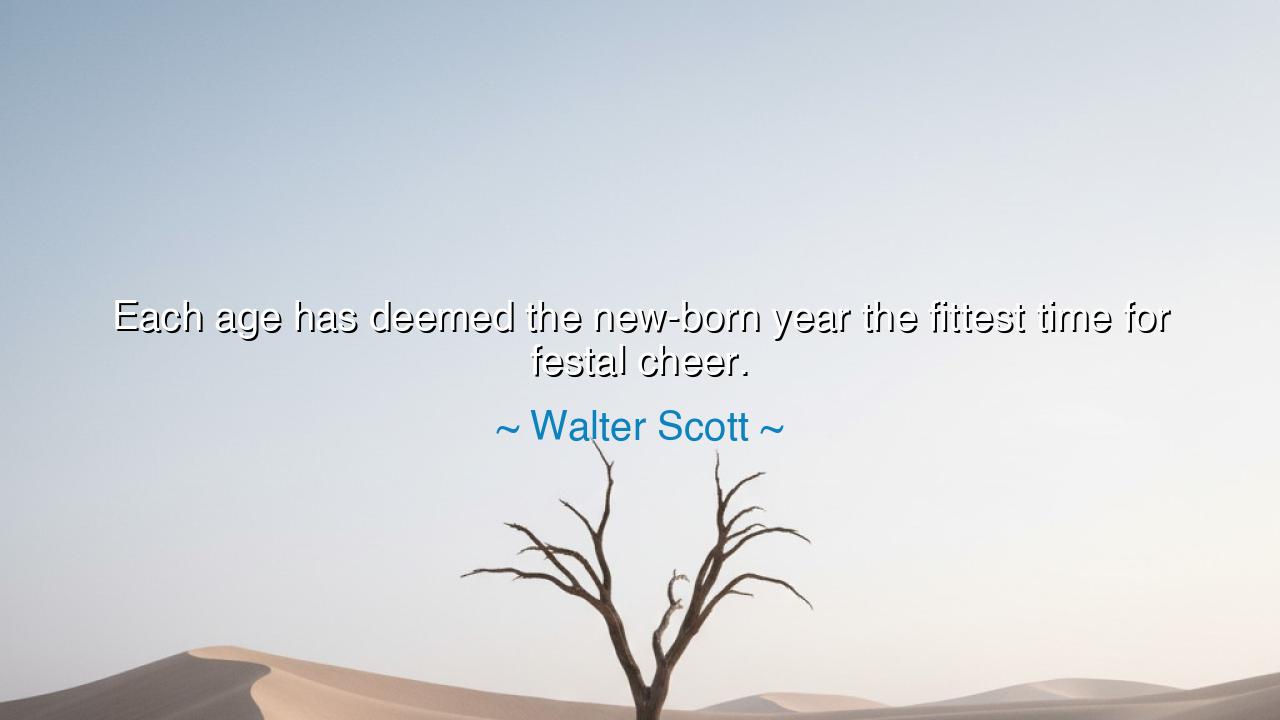
Each age has deemed the new-born year the fittest time for festal






The great Scottish bard Sir Walter Scott, master of history, heart, and song, once wrote: “Each age has deemed the new-born year the fittest time for festal cheer.” In this single poetic line, there is a wisdom both tender and timeless — a recognition of the human need to celebrate renewal, to pause in the march of days and give thanks for the gift of beginning again. To Scott, the new year was not merely a date on a calendar; it was a ritual of rebirth, a moment when hearts and hopes could be washed clean by the promise of time’s turning.
The origin of this quote comes from Scott’s poem “Marmion” (1808), an epic tale of honor, love, and tragedy set in medieval Scotland. Amid the valor and battle of his verse, Scott often paused to reflect upon the deeper cycles of life — on faith, history, and the nature of humanity itself. Here, he reminds us that every generation, no matter its trials or triumphs, finds meaning in the turning of the year. Whether in ancient Rome with its feasts to Janus, god of beginnings, or in the quiet hearths of the Scottish Highlands, the dawn of a new year has always stirred something sacred in the soul of mankind: the hope that the future can be better than the past.
In these words, we hear not only the poet’s voice, but the echo of centuries. For indeed, “each age has deemed the new-born year the fittest time for festal cheer.” Even when kingdoms fell and empires crumbled, even in times of famine or war, people gathered to celebrate the turning of time. Why? Because in that celebration lies defiance — a declaration that life, however fragile, continues. The new year is humanity’s oldest act of faith. When the world is cold and dark, we light candles, sing songs, and raise cups, not because all is well, but because we believe it can be.
Consider the story of London in 1940, during the Second World War. The city was battered by nightly bombings, its streets scarred and its people weary. Yet on New Year’s Eve, crowds still gathered near the Thames, singing “Auld Lang Syne” beneath a sky streaked with searchlights. They had little to eat and no guarantee of tomorrow, but they celebrated nonetheless — not out of foolishness, but out of courage. That night, they lived the truth of Scott’s words: that each age, no matter how burdened, seeks joy at the threshold of a new dawn. In the face of darkness, the human spirit chooses light.
The meaning of this quote, then, is not merely about festivity, but about the soul’s resilience. It speaks to the deep rhythm of renewal that beats within all living things. Every winter gives way to spring; every night to day. The “festal cheer” of the new year is not only merriment, but a sacred ritual — a reaffirmation that time offers us mercy. Whatever mistakes have been made, whatever pain endured, there is always another beginning. The turning of the year whispers to every heart: you may start again.
To live by this wisdom is to embrace both gratitude and hope. Gratitude for the days that have passed — for their lessons, even their sorrows — and hope for the days yet to come. When the new year arrives, it is not enough to toast or to sing; one must also reflect and renew. Set down the burdens that no longer serve you. Forgive those who have wronged you. Speak words of kindness, and sow the seeds of new intentions. For the festival is not only in the streets — it is in the soul.
The lesson, therefore, is eternal: rejoice not only in what you have gained, but in the very gift of being alive at the turning of the year. Celebrate, as your ancestors did, not because life is perfect, but because it continues. The past cannot be changed, but the future is born anew with every sunrise, and with it, so are you. Let the new year not simply pass over you — meet it with open hands and a willing heart. Every age has done so; every soul must do so still.
Thus remember, O keeper of time, the wisdom of Walter Scott: that to greet the new year with joy is to honor both the past and the promise of tomorrow. When the clock strikes midnight and the world holds its breath, do not think only of what is lost, but of what yet may be. For each dawn, like each new year, is the universe’s quiet invitation to begin again — in courage, in hope, and in festal cheer.






AAdministratorAdministrator
Welcome, honored guests. Please leave a comment, we will respond soon